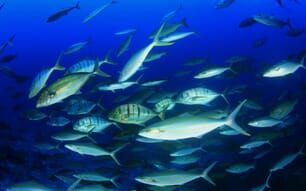In a policy brief issued today in advance of UNFCC talks in Bonn, Germany, the Food and Agriculture Organization of the United Nations (FAO), the Secretariat of the Pacific Community (SPC), the United Nations Environment Programme (UNEP), the World Bank, the WorldFish Center and 11 other organizations* warned that millions of fishers, fish farmers and coastal inhabitants will experience less stable livelihoods, changes in the availability and quality of fish for food, and heightened risks to their health, safety and homes as a result of climate change.
Many fishing and coastal communities subsist in precarious and vulnerable conditions because of poverty and rural underdevelopment, and their wellbeing is being further undermined by overexploitation of fishery resources and degraded ecosystems.
This situation risks being drastically worsened by climate change if immediate adaptation and mitigation measures are not effectively put in place, the brief says.
'Our aim here is to ensure that climate change negotiators and decision makers in their deliberations don't forget our freshwaters, seas and oceans and those who depend on them,' said Kevern Cochrane of FAO's Fisheries and Aquaculture Department. 'They must address these aquatic environments and the fishing, aquaculture and other coastal communities whose livelihoods and even survival will be threatened by climate change. Through their decisions and actions, they need to avoid policies that would damage already stressed aquatic resources and human lives and, instead, implement measures that take full advantage of the environmental and food security services that healthy aquatic resources offer.'
About 520 million people - around 8 percent of the world's population - depend on fisheries and aquaculture as a source of protein, income or family stability. For 400 million of the poorest of these, fish provides half or more of their animal protein and dietary minerals.
Multiple impacts
The build-up of carbon dioxide and other greenhouse gases in the atmosphere is known to be changing air and sea surface temperatures, rainfall and wind patterns, ocean acidity, sea levels and the intensity of tropical cyclones. Research has found that climate change is already modifying the distribution and productivity of marine and freshwater species, affecting biological processes, and altering food webs.
Aquatic ecosystems not only support fisheries by providing food, habitat and nursery grounds, the brief notes, but also protect communities from storms, which are predicted to become stronger and more frequent with climate change. Mangroves create barriers to destructive waves and hold sediments in place, reducing coastal erosion. Healthy coral reefs, sea grass beds and wetlands provide similar benefits.
Adaptation strategies, research and action needed
Adaptation and mitigation measures are needed to improve the management of fisheries and aquaculture and the integrity of aquatic ecosystems, respond to the threats to food and livelihood security posed by climate change, seize possible opportunities that arise with change, and help fisheries and aquaculture emit less greenhouse gas, according to the brief.
Research is required to understand the complex biological and chemical processes of aquatic ecosystems that, for example, determine the ocean carbon cycle and the currents and eddies that generate cyclones. Equally important is understanding how people adapt to living in a changing climate and how their institutions and livelihoods have evolved, and can further evolve, to maintain resilience in the face of future change.
The brief identifies a number of steps that should be taken to protect aquatic ecosystems, fisheries and aquaculture:
- Adopt environmentally friendly and fuel-efficient fishing and aquaculture practices.
- Eliminate subsidies that promote overfishing and excess fishing capacity.
- Undertake assessments of local vulnerability and risk.
- Build local-level ocean climate models.
- Strengthen knowledge of the dynamics of biogeochemical cycles in aquatic ecosystems, especially of carbon and nitrogen.
- Encourage sustainable, environmentally friendly biofuel production from algae and seaweed.
- Explore carbon sequestration in aquatic ecosystems.
- Implement comprehensive and integrated ecosystem approaches to managing oceans, coastal zones, fisheries and aquaculture; to adapting to climate change; and to reducing risk from natural disasters.
The partnership is working together to get these messages to climate policy opinion-formers and decision-makers. The Secretariat of the Pacific Community has urged government delegates to next week's UNFCCC meeting in Bonn to highlight the threats of climate change to the regions' important fisheries .
And in an article recently published in Nature Reports: Climate Change two of the policy brief's authors, Edward Allison of the World Fish Centre and Nicolas Dulvy of Simon Fraser University, further discussed the policy and research priorities that will help the fisheries sector to adapt to climate change as well as contribute to mitigation.


